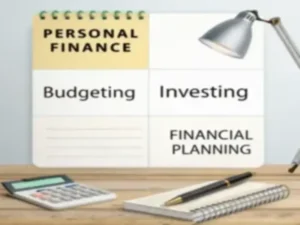Do you want to know about the five foundations of personal finance planning?
Five foundations of personal finance observing real people who develop a career as a stockbroker, teacher, and financial planner. You are observing the people who intuitively applied these basic principles to learn the simple secrets to building a secure financial future. However, you want the better and more prominent feature to be empowered and motivated to start a financial foundation, like a retirement plan and security, to be higher. In that case, this article is for you.
How do you start the five foundations of personal finance planning? This article outlines the five foundations you should establish to achieve financial freedom from your finances. Personal finance is a critical part of your everyday life. It is the basis of your ability to purchase a house, car, and others you like to own.
Like a retirement plan, the five foundations of personal finance also dictate your ability to meet your financial goals. So you think frequently and consider how to ensure that you are setting yourself a financial success. Unfortunately, according to Yahoo Finance, 30% of US citizens say they are in worse financial shape than in the past decade.
The main reasons for the current economic crises are high loan interest and financial instability. It needs to be more financial wisdom and better spending habits. As a result, we want to enlighten and educate people about the five foundations of personal finance management. After reading the finance blog, you will be well-equipped with the tools and resources you need to achieve your financial goals.
This blog post will teach you strategies for developing your financial goals. You can spend less than you earn, increase your savings, reduce debt or loans, and build assets. You also learned how to increase purchasing power with improved credit and built financial savings habits. We will explain the most important principles and branches of the economy.
Are you feeling interested? Take advantage of every point. Finances were born as a tool to manage all your commercial activities that were developing. Millions of students choose to study finance and banking as their major subjects. This is because they relate it professionally with a job opportunity and can deal with and manage clients’ personal finance resources and larger corporate companies’ financial issues. This area includes:
- Managing expenses
- Incoming resources
- Budgets
Its most effective terms and method are that companies must manage their available income efficiently.
What are personal finances?
In short, personal finance refers to what you do with all the money you earn or receive.
For this reason, personal finances involve having a specific plan for the money you have. But do you know how much money you have?
To find out, apply the definition of personal finance: add up all your income and subtract it from savings, expenses, asset protection, and investment for the future.
What are the basics of the Five foundations of personal finance?
These basic five foundations of personal finance steps will help you grow with more financial confidence:
- Save an emergency fund: Ami or $500
- Pay off your debt fast.
- Buy your car with cash.
- Pay cash for college.
- Build wealth with investment & give back.
Why are the five foundations of personal finance important?
We often overlook the importance of managing personal finances in today’s society. We want to send a powerful message that gives you a sense of success and empowerment.
The core reason for understanding the basic five foundations of personal finance that can help you make a financial plan and achieve financial freedom. It will help you find the right truck, and you can make positive decisions that lead to your financial success.
How do you define your financial freedom? But from our point of view, it means having more cash flow that meets your goals and enjoying your life just the way you want.
Think about what you could do in an emergency financial crisis. You will have extra cash to pay for a house or car repair, medical bills, or other emergencies. You will effectively manage your money so you can be surer it is there when you need it.
What Are the Five Foundations of Personal Finance Strategies?
The five foundations of personal finance are a popular set of principles that will help you get a handle on your financial future.
Many people need help to deal with their finance by tucking expense categories. Yet, it is a golden opportunity to take long-term control of your financial habit and future. According to a recent survey, 65% do not know personal finance, and 68% say they want to learn about the five foundations of personal finance.
Even if you need to learn about the five foundations of personal finance, reading through this foundation will take a big step toward building make-your-money-smarts. Follow the easy steps of expert recommendations to help you live healthy financial lives.
Let’s jump into the five foundations of personal finance together.
Save an emergency fund: Ami or $500
Because of the recent economic crisis, almost 40 million Americans live below the poverty line, lack of employment opportunities, and have an unequal distribution of resources. Many employed workers need more savings to cover unexpected expenses despite a regular income. According to a current study from bank reports that 60% of US citizens do not have enough cash on hand to cover their emergency expenses of $1000.
Your emergency fund is your first line of defense against any unexpected financial crisis. Having at least $500 in your emergency account will protect you from significant debt and eliminate your major expenses. Start by putting $ 5 into your emergency account each week.
Managing this habit can improve your wealth-building behaviors to achieve financial stability. This deposit should be kept in a separate account and consistent with your regular savings.
It would help to re-evaluate your present lifestyle and consider what you need to live comfortably. Refrain from scrimping too much; quality of life should come first. Think first about which expenses you can easily reduce while avoiding becoming unhappy. Be frugal while also including some bloody fun in your daily lifestyle.
Here are a few examples:
- Eat at home instead of out; homemade meals are less expensive than eating out.
- Cancel all club membership; that is not a basic need of your living life.
- Ride on public transport rather than driving your car that will give you extra benefit from some light exercise
- Sale your unused belongings; one person’s trash is another one’s treasure.
Pay off your debt fast.
In America, debt is the norm, and everyone gets their share.
Pay off your debts if you already have a credit card or college tuition. Make it a priority to pay the debt as soon as possible. The faster you can pay off your debt less interest you will have to pay. In addition, it will keep more of your money over the long term, which will help you get out of debt, make a spending budget, and stick to it.
Debt is especially high-rated interest, like a credit card. The faster you can pay off will start investing for a retirement plan, funding your children’s education, buying a car, home, and many more. There are two basic categories of debt when prioritizing your debt repayment.
- First: consider your short-term debt, like home loans and high-interest credit card balances. Short-term debt has higher interest than long-term debt; it is wise to pay it off as soon as possible.
- Second: consider your long-term debt like a mortgage, student loan, and low-interest credit card balance. If you have long-term debt trying to pay off quickly during times of high inflation. Making debt payments in time and being wary about taking on new long-term loans might be preferable.
Realize debt can negatively affect your financial stability, so repay the debt as much as possible. You must understand how debt will affect your net income since you always pay installments. Being debt free reduces the enormous burden and allows your life to open up to more possibilities. Try to avoid debt; the more debt you have to pay more interest which will drag you down in the long run.
Ask yourself
- Where can I cut back on spending?
- Do your usual expenses outweigh income? If yes, by how much?
- How much to pay toward your debt each month?
- What opportunities do you have to earn a little extra income?
Analyzing your paying receipts will help you become more aware of your spending habits and be able to adjust them as needed.
Buy your car with cash.
According to Investopedia, many Americans still take debt for car purchases and now carry over $1.55 trillion, comprising 10% of household loans. The current statistics show Americans borrow more than $60 billion monthly for new vehicle loans and pay $70 billion for used cars.
Many people purchasing a car is a rite of passage, but most do not consider the long-run implications of the fiscal impact. It is easy to get a car loan from Americans, which is why many people have been in financial trouble because of unpredictable circumstances.
They need to analyze their future repayment solutions before entering such a commitment. It is often a liability and depreciates. Repair and maintenance costs add to your monthly burden, so understand you lose money when buying a new car.
Understand the goals for purchasing a car with cash, not by the borrowed fund:
- Set a budget: be honest about which car types serve your purpose.
- Save up for your car: Use a zero-based budget towards your saving goals.
- Do not purchase a new brand: everyone else buys a pre-owned car.
- Know where to shop it: look for online car retailers, private sellers, and independent used car dealerships in your area.
- Inspect before purchase: Inspecting before buying that pre-owned will cost some extra cash, but it could save tears on the flip side.
- Know negation tactics to get the right price: Brush up on negation tactics that help you get a great deal.
Try to understand these three steps; you can lose money when buying a new car.
- Interest will include the principal amount when the payment is more expensive than the advertised price.
- Payment: You may stop your savings to pay off your car loan.
- Depreciation: Vehicles lose their value. When you plan to sell will have less value than initially paid.
Therefore, paying cash frees from the pressure of debt. It can focus on other issues, like economic security and financial development.
Pay cash for college.
Many American government loans and subsidies help students pay for their education. However, there are still great socioeconomic inequalities among different races in the education system, which influences the basis of their education is not a fair deal.
That is why many students are forced to take student loans. As a result, they graduate with thousands of dollars in debt. As a result, college can be expensive and complicated by young graduates’ financial management and future income.
So entirely avoid student loans when picking the right school and make the right choices.
According to NerdWallet’sNerdWallet’s 2022, the average student loan in the United States was nearly $1.60 trillion.
Dave Ramsey advised against going into debt for college two rules.
- One: Pay cash or college
- Two: if you have cash or a scholarship to go
Tips for avoiding student loans
- You can apply for student financial aid or a scholarship.
- You should find a part-time job to pay your tuition fees.
- You should use your funds and ask for help from family members.
- Choose schools or colleges with lower tuition costs
The ability to pay cash for your school or college education can provide a stress-free life and allow financial advance after graduation. You will become graduate debt free.
Build wealth with investment & give back.
The ability to build wealth, to pursue dreams and goals while being outrageously generous. Your wealth should be used for productive purposes rather than enjoying a luxurious life.
Grow financial confidence or life! No matter where you are on a financial journey, you can change lives with a foundation in personal finance.
Finance advisors are setting on the edge with basic principles. Would you like to know? Let’s start
It is your long-term financial goals & happiness, so ask you the question:
- What other financial goals do you have?
- Where do you want to be financially in ten years?
- What kinds of things do you want to own?
- What kinds of expenses do you want to have?
By answering the above question, you will adopt a long-term perspective of personal finances rather than focusing on covering your expenses.
Do not worry if you need to learn how to respond with certainty. The financial goal is to schedule only part of life. It improves your financial literacy and responsibility and builds a financial roadmap.
This foundation has two elements:
Build wealth
It is the key to ensuring you have sufficient money in your life. It empowers you to have enough control of your life to make better life decisions. You should have smart savings and emergency funds to support your lifestyle.
More financial resources also advise to build wealth. Your saving can explore investing and gaining your retirement insurance. Investment habits can help build wealth by growing capital and help you support your family after retirement.
Share your wealth
When you reach your financial goals and then spend them on your family, you have positively affected someone’s life and can bring peace of mind. So share your wealth, and then you enjoy what you have.
Final Thought
There are many reasons and a lack of accountability for the financial instability of individuals. Financial freedom means that you have complete control over your finances. Suppose you can cut your spending and ability to save more to get financial freedom. Five foundations of personal finance give you a road map to make better financial decisions and fulfill your goals.
However, make a wise financial decision and know how to increase income resources and manage your debts. We hope the five foundations of personal finance help you get a good start on the right financial track from saving and smart investing.
Read also: How to Find Next Gen Personal Finance Answers Key







